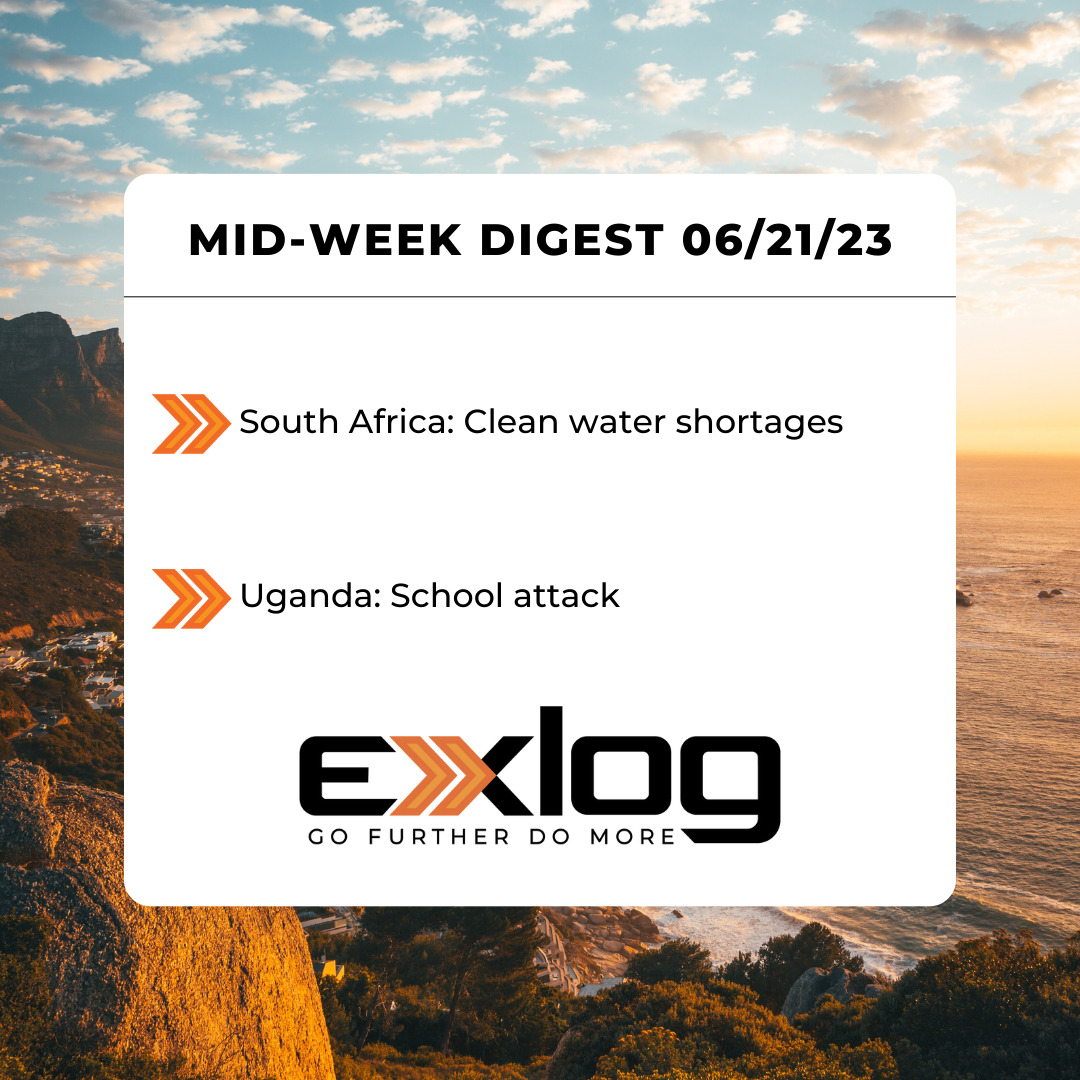Clean water shortages in South Africa and school attack in Uganda
South Africa: Worsening shortages of clean water
A prolonged degradation of South Africa’s water sector has led to a severe shortage of clean water. Demand has outstripped water supply in several areas throughout the country since late 2022. Reservoirs near Johannesburg have reached critically low water levels, leading to intermittent supply, low pressure, and prolonged outages. After experiencing a drought between 2015-2018, Cape Town has already been implementing measures targeting reduced water consumption by its residents and lower water pressure in its distribution networks. Nonetheless, the city’s water processing and distribution remain in danger of collapsing due to past damage. This damage has led to sewage leaks, causing multiple beaches to close in Cape Town and eThekwini municipalities due to unacceptable E. coli levels. Similarly, 29 residents of a small township north of Pretoria have died of cholera since May 23. Residents in wealthier neighborhoods have taken to digging private boreholes to source water. Individuals in areas that do not have access to piped or clean water continue to collect rainwater or purchase bottled water. The predominant causes of this growing crisis are poorly maintained water and electricity infrastructure. Leaks in the nation’s water supply network are resulting in the loss of 70 million liters of clean water per day. Scheduled electricity blackouts since 2008 have exacerbated the current water supply issues by shutting off pumps that can resupply reservoirs, deliver water, or drain sewage. While electricity outages have exacerbated the problem, South Africa remains a water-scarce country that is overexploiting its renewable water resources. South Africa’s current water shortages will continue until infrastructure investments and repairs can be made to either its water or electricity sectors.
Uganda: School attack marks the deadliest terror act since 2010
Five men armed with machetes and firebombs stormed a private boarding school compound in the southwestern district of Kasese – located about 2 km from the Congolese border – on June 16, killing at least 42 people. The incident marked the deadliest attack in the country since the twin suicide bombings in Kampala conducted by the Somali-based militant group Al-Shabaab in July 2010. The attackers shot and killed the school’s security guard and threw firebombs into students’ dormitories, attacking fleeing students with machetes. The perpetrators also kidnapped six students and looted the school premises before fleeing to the border with the Democratic Republic of Congo (DRC). Security forces rescued three of the abducted students following clashes with the perpetrators in the Virunga National Park – a wildlife sanctuary in the DRC – on June 21; the search for the remaining victims is ongoing. Ugandan authorities have blamed the attack on the Allied Democratic Forces (ADF) – a DRC-based extremist organization formed by former Ugandan rebels that pledged allegiance to the Islamic State (IS) in 2019; the group did not claim responsibility for the attack. The ADF has reportedly expanded its areas of operations and capabilities since 2021 when the group conducted several bombings in Kampala, prompting the Ugandan government to deploy troops to join the Congolese military in countering the group inside the DRC. However, an uptick in activity of another DRC-based armed group, the March 23 Movement (M23), in mid-2022 prompted Kinshasa to withdraw some DRC troops from ADF-affected areas, creating a security vacuum and likely emboldening the group. In response to the incident, Ugandan President Yoweri Museveni announced on June 18 the deployment of additional Ugandan troops to the western border with the DRC. The increased military presence on the Uganda-DRC border and continued counter-terrorism efforts targeting the group inside the DRC may lead to a decrease in ADF activity in the coming weeks, although such measures are unlikely to deter future ADF attacks inside Uganda in the long term.


